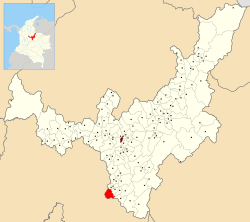Guayatá facts for kids
Quick facts for kids
Guayatá
|
||
|---|---|---|
|
Municipality and town
|
||
|
||

Location of the municipality and town of Guayatá in the Boyacá Department of Colombia
|
||
| Country | ||
| Department | Boyacá Department | |
| Province | Eastern Boyacá Province | |
| Founded | 6 April 1821 | |
| Founded by | Andrés José Medina Narciso | |
| Area | ||
| • Municipality and town | 112 km2 (43 sq mi) | |
| Elevation | 1,767 m (5,797 ft) | |
| Population
(2015)
|
||
| • Municipality and town | 5,126 | |
| • Density | 45.77/km2 (118.5/sq mi) | |
| • Urban | 1,302 | |
| Demonym(s) | Guayatuno/a | |
| Time zone | UTC-5 (Colombia Standard Time) | |
| Website | Official website: http://www.guayata-boyaca.gov.co/ | |
Guayatá is a town and a municipality located in the Eastern Boyacá Province of Colombia. It's part of the Boyacá Department. Guayatá sits on a high plateau called the Altiplano Cundiboyacense. It is about 129 kilometers (80 miles) from Tunja, the capital city of the department. It's also about 132 kilometers (82 miles) from Bogotá, the capital city of Colombia. The main part of the town is located at an altitude of 1,767 meters (5,797 feet) above sea level. The land in the municipality ranges from 1,270 meters (4,167 feet) to 3,080 meters (10,105 feet) high.
Contents
Where is Guayatá Located?
Guayatá shares its borders with several other places:
- To the north, it borders Guateque.
- To the west, it borders Manta in the Cundinamarca Department.
- To the south, it borders Gachetá and Ubalá, also in Cundinamarca.
- To the east, it borders Somondoco and Chivor.
What Does the Name Guayatá Mean?
The name Guayatá comes from the ancient Chibcha language. It might mean "land over there" or "farmfields," combined with "Guaya," which is a creek in a nearby area called Tenza. Another idea is that it comes from "Guaitá," meaning "the area ruled by a female cacique" (a local leader).
A Look Back: Guayatá's History
Before the Spanish arrived in Colombia, the area around Guayatá was home to the Muisca people. They were an advanced civilization known for their farming. The Muisca lived in a loose group of communities called the Muisca Confederation.
In what is now Guayatá, the Muisca grew cotton. This was very important for making their special clothes and blankets. They also traded feathers from birds they hunted.
When the Spanish conquistadores first came to Guayatá, they found that the Muisca used unique forms of money. This money included small pieces of cloth, gold, or emeralds. The gold pieces used as money were simple and not decorated. Much of what we know about the Muisca from this time comes from the writings of a friar named Pedro Simón.
Modern Guayatá was officially founded on April 6, 1821. It was established by Andrés José Medina Narciso. This happened just a few months before Colombia gained its independence from Spain and became part of the Republic of Gran Colombia.
How People Make a Living in Guayatá
The main way people earn money in Guayatá is through agriculture (farming). Farmers here grow many different crops, including:
- Maize (corn)
- Arracacha (a root vegetable)
- Bananas
- Yuca (cassava)
- Beans
- Potatoes
- Coffee
- Pumpkins
- Peas
Guayatá is also famous for its delicious bread rolls, known as mogollas.
Fun Facts About Guayatá
- Market day in Guayatá is every Tuesday. This is when people gather to buy and sell goods.
- The average temperature in Guayatá is about 19 degrees Celsius (66 degrees Fahrenheit).
- The DANE code for Guayatá is 15325. This is a special number used for official statistics in Colombia.
Famous People from Guayatá
- Roberto "Pajarito" Buitrago was a professional cyclist who was born in Guayatá.
See also
 In Spanish: Guayatá para niños
In Spanish: Guayatá para niños
 | Madam C. J. Walker |
 | Janet Emerson Bashen |
 | Annie Turnbo Malone |
 | Maggie L. Walker |


